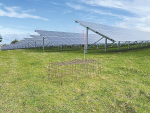Every meal we eat costs the planet 10kgs of soil, 800 litres of fresh water and 1.3 litres of diesel fuel, says science writer Julian Cribb.
“That’s what it takes to feed the typical person for just one meal – and when you multiply it by 7.3 billion people each eating around a thousand meals a year, our modern food system is devouring a vast amount of resources unsustainably,”
Cribb is the author of The Coming Famine: the global food crisis and how we can avoid it (UCP 2010). He is one of the speakers due to talk at the Horticulture New Zealand Conference this week in Rotorua.
“Eating is our largest personal impact on the planet – but few people appreciate how big it is,” Cribb says.
He says New Zealand’s innovative and efficient growers and food producers are well placed to provide the creativity required to feed the planet in the future.
“The world currently loses around 75 billion tonnes of topsoil a year. Despite progress in countries like New Zealand, global soil degradation is getting worse, not better. At such rates, scientists are warning we may run short of good farming soils within 50-70 years.”
Cribb says the picture is similar for water, with more than 4000 cubic kilometres of groundwater being extracted – most of it unsustainably – every year. Places like north China, the Indo-Gangetic region, the Middle East and Midwest and Western USA face critical water shortages by the 2030s. Places like California and Brazil already face them.
Meanwhile huge cities, coalmines and gas companies are grabbing the farmers’ remaining water – making the task of feeding the world so much harder.
“Most governments and consumers fail to recognise that scarcities of water, land, oil, nutrients, technology, fish and finance are now acting in sync – and being amplified by climate shocks,” he says.
Equally important is the fact that three out of every four people in well-off societies now die from a diet-related disease. This pandemic of preventable disease now consumes three quarters of our exploding healthcare budgets, explains Cribb.
“So there are two major reasons to radically change the world diet – health and sustainability.”
Cribb says local horticultural producers will be leaders in this change.
“There are huge opportunities for new foods, new crops, new production systems and novel diets which are healthier and more sustainable as well as delicious,” he says.
According to Cribb, humanity currently consumes just a few hundred different plants, with the modern diet largely based on just five grains and five animals. However, he says there are 27,600 edible plants on Earth, mostly vegetables and most of them unknown to the majority of people.
“We have not yet begun to explore the agricultural, health and culinary potential of our home planet – and now is the perfect time to do so,” argues Cribb.
“I predict that over the coming two decades, this will lead to a major boom in local food production both in the cultivation of thousands of novel crops, in the development of new production systems such as aquaponics, protected cropping, biocultures, algae culture and green cities, and in the design of new foods and diets.”
“It is already clear from social media we are witnessing the start of a global revolt by consumers against the industrialised food system that is making them sick, and destroying farming communities and landscapes.”
Cribb says that these forces are changing the nature of food in favour of lighter, healthier more sustainable diets dominated by a huge variety of fruit and vegetables.
“Never has world cuisine been so spectacularly diverse – or so far short of its true potential,” he says.
“Food is one of the most creative acts which humans perform, and New Zealand’s growers – always highly innovative - will be at the forefront in that creativity.
“This isn’t just a matter of fashion. In a world of ten billion people, how intelligently we design our food will define the future of our civilization, now and for all time, for good or ill.”



















